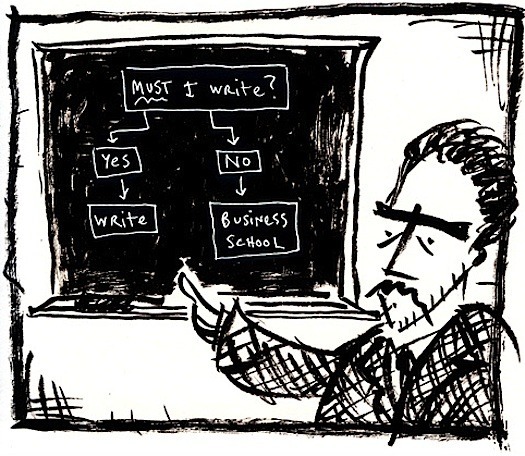Drew Myron's Blog, page 81
September 8, 2011
Thankful Thursday: "I'm not a poet"
 Photo by Shreyas Panambur I like poems by people who aren't poets.
Photo by Shreyas Panambur I like poems by people who aren't poets.
After a summer of writing workshops — both attending and leading — I am reminded that I like poetry best in small groups. I like the circle of new names. Each of us offering ourselves on the page, like a date, a gift. We are gathered in an effort to make things matter.
I'm not a writer, they'll say, before reading their work. Huddled together in hope, we lean in, eyes open to the words, to the room's reverent hush.
I'm not a poet, they'll say between umms and ahhhs and throat clearing. The voice shakes, a hand trembles.
When done, the reader will fix eyes on the page, and then searching, will look to us in a pause between nod and praise. A half-smile of gratitude appears, a bit of disbelief, a rush of relief.
I don't usually remember the poem, can't recall lines or even a passage. It's the cracked voice I know, the tremor, the space between the last word and the first applause.
Always a poem is a victory. The writer saying I am.
It's Thankful Thursday. Joy expands and contracts in direct relation to our sense of gratitude. What are you thankful for today? A person, a place, a thing? A story, a song, a poem? What makes your world expand?
September 6, 2011
Be the teacher you needed
Job Description
- for the apprentices
Be nourishing as damp spring soil,
tenacious, faithful as seed buried there.
Be quick, clear as water in a freshet,
determined to go the distance to the sea.
Be solid, dependable as river rock,
smooth and malleable to stream flow.
Have a preference for order &
the ability to laugh during chaos.
Whisper to the bully,
"I don't want to crush your spirit,"
to the shy, self-conscious one,
"I love your socks."
In a world of straight rows
facing the chalkboard, intercom, flag,
Make a circle, listen, sit near the light.
Magician, custodian, queen and scholar,
Remember when you learned to speak Portuguese,
remember the play — no part for you —
Remember the loneliness of the beginner's path,
and be a beginner again —
and again — because you are, will be,
with each new circle, in very lighted space.
Be the ladder, be the lighthouse,
be the lightning bug.
Be the open heart, an idea unspooling.
Be the teacher you needed
that winter your grandfather died,
and the next year when you walked-on to Varsity.
Know yourself as essential,
your students, most important.
You will give and give and give.
No one will witness
your six hundred close judgment calls a day,
but your students will remember
notes in your handwriting
written in the margins of their young lives.
- Ann Staley
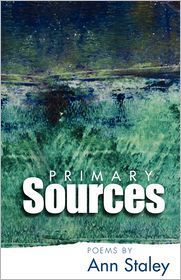 A poet based in Corvallis, Oregon, Ann Staley has been a teacher for over 40 years. She has taught grade-schoolers to grandmothers, and has worked in five Oregon school districts, two community colleges, two public universities, and two private colleges. Her first poetry collection, Primary Sources, was published in August 2011.
A poet based in Corvallis, Oregon, Ann Staley has been a teacher for over 40 years. She has taught grade-schoolers to grandmothers, and has worked in five Oregon school districts, two community colleges, two public universities, and two private colleges. Her first poetry collection, Primary Sources, was published in August 2011.
September 3, 2011
On our knees
Words feed us just as they separate us.
We stand at parties, we hold drinks, we tell jokes, we laugh, and we talk politics.
But we are always aware of the differences between us and the people we like or even love. They are a part of the world in a way that we can never be. They inhabit their space. We observe and analyze, rub meaning from moments, and yet none of it is truly real to us until we write it down. And when we don't write — when we pretend that we can be like those we surround ourselves with, and fill our lives with kids and work and PTA and husbands who would rather watch TV than read — we end up on our knees.
Laurie Rachkus Uttich
Why We Write: The Space That Separates Us
from Poets & Writers magazine, Sept Oct 2011
August 31, 2011
10 Ways to Make Writing Friends

"I need more creative conversation," a new friend confides.
It's a need I know well. And judging by response to the question recently raised — How do you make writing friends? — many of us are seeking meaningful conversation.
Combining reader response with my own experience, I offer some suggestions:
How to Make Writing Friends
IN PERSON
1. Join (or Start) a Writing Group
Join a local writing group. Can't find one? Start your own!
Writing Alone, Writing Together is a handy get-started guide.
Success: Years ago I moved to a small, remote town and had no writing friends. I couldn't find a writing group so I started my own. I created a structure — a monthly drop-in writing session held in my home. I served soup and offered writing prompts — and spread the word by posting fliers in the laundromat, post office and local restaurants. The first session, a dark and stormy night, the house filled with first-time and experienced writers of fiction, poetry, essay and more. We met for more than two years, and then held our first public reading at a local coffeehouse. Over 50 people attended the reading and Off the Page became an annual event. Now in its fifth year, Off the Page features writers of all levels and genres, from all over Oregon.
Caveat: I found a writing groups that met in the next town. They were a warm and welcoming collection of writers — and dedicated, too, meeting for several hours every week. The members were retired and they met in the afternoon, at a time that, unfortunately, did not fit my work schedule. Still, I am grateful for the brief time I spent with these gracious writers. My advice: Find a group that fits your schedule, personality and writing process. Don't get discouraged. Finding a good fit takes time, effort and an open mind.
2. Take a Class
Polish your skills and meet other writers. Find writing classes at community colleges, bookstores, community centers and libraries. But remember, it's not enough to just attend class, you gotta participate, and then — gasp! — reach out to others.
Success: "I met my first writing friends by going to a free mini-workshop put on by a local writer's conference," says Linda, a reader of this blog. "At that first meeting almost 28 years ago, I met my friend and lifelong writing buddy — we still remain best friends and writing pals to this day!"
3. Volunteer
Schools, libraries and community centers are in desperate need of caring, committed volunteers. When you volunteer, you help others and you help yourself by expanding your social circle. "How about volunteering at the library?" suggests Fred, a reader of this blog. "Maybe not all are writers, but they all read." He's right. Volunteer at the library and you've already got a common bond: a love of books.
4. Attend Readings & Open Mics
It's not enough to read and write, you've got to support other readers and writers. You want your words in the world? You want attention and applause? You've gotta give it to get it. And here's the bonus: While you're cheering on others, you're also increasing your odds of making new friends.
5. Write a Letter
I enjoy writing letters of appreciation to authors. When I was 10 years old, I wrote my first "fan" letter, to Judy Blume, author of Are You There God? It's Me, Margaret. The handwritten letter I received in response made me a dedicated fan of Blume, and of books. "Write fan letters to your favorite authors," says Linda, a reader of this blog. "Sometimes they respond and become writing friends."
Caveat: In recent years I've penned letters of appreciation to poets whose books I enjoyed. Sadly, I've received no response. And while it's disappointing, it's also a good reminder that we're each at different places and paces in our lives.
ONLINE
6. Read (and Respond to) Blogs
The web is chocked with writing blogs. These online resources offer information and inspiration, and most bloggers want to interact with their readers. Get connected by leaving a comment on a blog post, or sending an email to your favorite blogger. Reach out. You may be pleasantly surprised to find a writer — like you — ready to make a friend.
Success: A friend, who I met through my blog, calls herself a "lurker" — a person who reads blogs but never leaves a comment. She lurks on the edges as an observer. When this shy reader-writer took a chance and entered a blog drawing, she won the book — and made a friend.
7. Linked In
LinkedIn is a business-related social network, and a good place to meet writing professionals. The site is packed with hundreds of writing-related groups with active message boards and opportunities. Check out: Book Writer, Certified Professional Writers Association, Poetic Asides, and more.
8. Facebook
Sure, Facebook can be an endless feed of meaningless banter, but when used with focus this social network can yield writing groups and support. For example, do a Search for "Poets" or "Fiction" or "Writing Groups" and you'll find numerous options. Or search for your favorite author or book and you'll easily find a ready-made group with at least one thing in common.
9. GoodReads
What writer doesn't love to read? (If you don't read, don't tell me. It's too painful to know). Share your love of books with others on Goodreads, and let this shared passion lead to new friends — and book suggestions.
10. Be Brave
Making friends can be difficult. Like dating or a job search, finding friends can stir all kinds of insecurities. Sometimes you just have to buck up and be brave. I made friends, explains Molly, a reader of this blog, by asking classmates if they wanted to get together after class. "I mustered my courage to go a step beyond."
August 27, 2011
Your life must be witness to this impulse.
In the early 1900s, Franz Kappus was an aspiring poet enrolled in military school when he wrote to Rainer Maria Rilke for writing advice. Rilke's response turned into a six year correspondence, and spawned Letters to a Young Poet:
" . . . ask yourself in the most silent hour of your night: must I write? Dig into yourself for a deep answer. And if this answer rings out in assent, if you meet this solemn question with a strong, simple "I must", then build your life in accordance with this necessity; your whole life, even into its humblest and most indifferent hour, must become a sign and witness to this impulse."
Austin Kleon, the inspired artist-poet, cleverly illustrates Rilke's writing advice. See more here.
Saved — by friends and poems
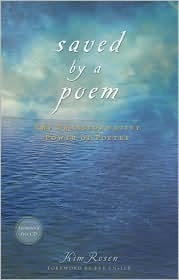 How to make writing friends?
How to make writing friends?
Toss out the question and let the suggestions swim in.
Thanks for the great ideas. They landed by blog, email, and message board. I'll share them all soon.
But first things first: The winner of the drawing for the book, Saved by a Poem, is . . . Molly Spencer.
Thanks again for sharing your ideas and stories.
August 24, 2011
The world is full of words. Use them.
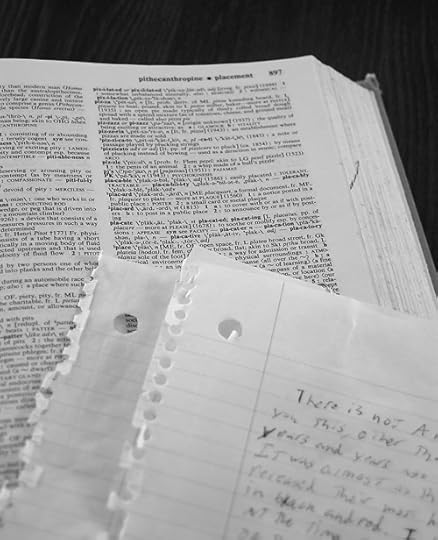 Annoying Words
Annoying Words
(I Beg You Not to Speak, Write or Use)
Really? Seriously?
Hand me a muzzle. I cannot bear to hear one more tart and snarky Really?
Used as a barb to show displeasure, this one word response requires no articulation, and no carefully considered critical thinking. Really? — delivered with an annoying inflection, and followed by Seriously? — is just plain lazy. And overused. At one time, say three years ago, this succinct response was clever and a little bit cute. Now really is yesterday's amazing.
Actually
Actually is an unnecessary word, a filler that quickly bloats and bothers. Diane Lockward at Blogalicious offers this well-put rant: "I want to place a restraining order on the word actually. Forever, not temporarily. The word has used up its lifetime quota. Overused and misused, it's become a sort of verbal punctuation mark or a space holder. Well, actually. How many sentences now begin that way? Actually, a lot. How many responses begin that way?"
Literally
Like so many good words, literally has been abused.
In its standard use, literally means "in a literal sense, as opposed to a nonliteral or exaggerated sense." In recent years, according to my trusty dictionary, an extended use of literally has become very common, where literally is used deliberately in nonliteral contexts, for added effect: they bought the car and literally ran it into the ground. This use can lead to unintentional humorous effects: we were literally killing ourselves laughing and is not acceptable in formal English.
Kelli Russell Agodon sees the lighter side of literally: "I confess I love it when people misuse the word literally. I literally yelled my head off. Really, that must have been very painful for you and how weird you're still alive. I literally died laughing. Really. So you're a zombie now. I know some people get really annoyed with the misuse, but in my head, I love it. I literally see all the things these people literally did."
Bless her heart, I'm not there yet.
I may be cranky but I don't think I'm alone: What's got you bothered?
August 18, 2011
How to make friends (and win a book)
After I gushed last week about my gratitude for writing friends, a reader raised a critical point:
How do I make writing friends?
Excellent question! It's not easy making friends, at any age, and it can be a real challenge to find niche companions. Want a running partner? Head to the running store. Seeking foodie friends? Take a cooking class. But writing friends? Do you stalk bookstore shelves looking for people with pens? Pace the paper aisle of your local Staples?
Desperate needs call for desperate measures but you don't want to appear desperate. Get too needy and you are a neon sign broadcasting Danger!
You want to cultivate literary friends, but how?
I've got a few ideas, born out of desperation and desire. But before I spill my first-hand blunders and sometimes success, I want to hear from you — and I'll sweeten the deal by offering a free book. Tell me:
How do you make writing friends?
Where and how have you made friends? What's worked? What hasn't?
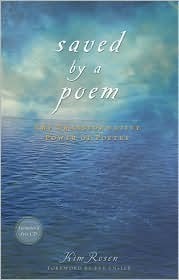 Jot a note in the comments section below, and I'll enter you in the drawing for Saved by a Poem: The Transformative Power of Words by Kim Rosen.
Jot a note in the comments section below, and I'll enter you in the drawing for Saved by a Poem: The Transformative Power of Words by Kim Rosen.
Feeling shy? Send me an email with your suggestions to dcm@drewmyron.com. I'll include you in the drawing, too.
Deadline to enter is Thursday, August 25, 2011. Winner of the random (i.e. highly unscientific, blindfolded drawing of name) will be announced on Friday, August 26, 2011.
Looking forward to your ideas, experiences and suggestions!
August 15, 2011
Secrets of Adulthood, and other happiness
It is easy to be heavy: hard to be light.
— G.K. Chesterton
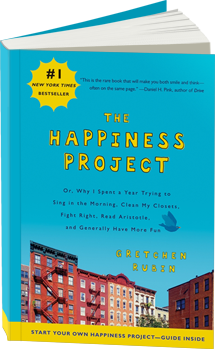 Because life sometimes seems a checklist of adversity, I groaned a bit when my sister pressed The Happiness Project into my hands. But contrary to first instinct, this book is not just fluff. The Happiness Project is an engaging, action-oriented read. Author Gretchen Rubin thoughtfully explores — through research and personal experiments — what it takes to feel happy. And while she seems a tad Type A (charts, resolutions, progress reports) I applaud her tenacity. A zealot for happiness sure beats a zealot for gloom.
Because life sometimes seems a checklist of adversity, I groaned a bit when my sister pressed The Happiness Project into my hands. But contrary to first instinct, this book is not just fluff. The Happiness Project is an engaging, action-oriented read. Author Gretchen Rubin thoughtfully explores — through research and personal experiments — what it takes to feel happy. And while she seems a tad Type A (charts, resolutions, progress reports) I applaud her tenacity. A zealot for happiness sure beats a zealot for gloom.
Packed with commandments, secrets and manifestos, the book appeals to my love of lists and order. I especially like her Secrets of Adulthood:
People don't notice your mistakes as much as you think.
It's okay to ask for help.
Most decisions don't require extensive research.
Do good, feel good.
It's important to be nice to everyone.
Bring a sweater.
By doing a little bit each day, you can get a lot accomplished.
Soap and water remove most stains.
Turning the computer on and off a few times often fixes a glitch.
If you can't find something, clean up.
You can choose what you do; you can't choose what you like to do.
Happiness doesn't always make you feel happy.
What you do every day matters more than what you do once in a while.
You don't have to be good at everything.
If you're not failing, you're not trying hard enough.
Over-the-counter medicines are very effective.
Don't let the perfect be the enemy of the good.
What's fun for other people may not be fun for you — and vice versa.
People actually prefer that you buy wedding gifts off their registry.
You can't profoundly change your children's natures by nagging them or signing them up for classes.
No deposit, no return.
And speaking of happy, the Secret Society of Happy People is celebrating Happiness Happens Month.
"Somewhere between The Ed Sullivan Show and The Jerry Springer Show talking about being happy became politically incorrect," notes the Society. "We're more comfortable airing our dirty laundry than telling people we've had a happy moment. . . Since happiness is contagious, if more people are recognizing and talking about it then more people will be happy. And ultimately, our world needs more happy people."
August 11, 2011
Thankful Thursday: Writer Friends
"You must have writing friends. Kill the idea of the lone, suffering artist. We suffer anyway as human beings. Don't make it any harder on yourself."
— Natalie Goldberg, author of Writing Down the Bones: Freeing the Writer Within
For years I wrote in the dark, clutching pen and paper and hiding anything that might reveal my loneliness, my need. I was a reporter in the early years of my writing career and I valued the ability to peer into the lives of others with measures of detachment and objectivity. Writing poetry was entirely different: I felt exposed, vulnerable, and afraid.
Attending my first writing workshop — with poet Judyth Hill, in Taos, New Mexico — cracked me open, and changed my life. Writing needs air, she said, needs to be shared. From that week I grew less afraid and more willing — even eager — to make writing friends.
Writing friends are not like other friends. We don't borrow sugar or share Facebook banter. We don't talk kids or jobs or everyday worries. Our focus is rather narrow. We meet to write, read, and share the writing life. We take part in "acts of literature" — things that feed creativity.
This morning, I enjoyed a weekly coffee and conversation with a poet-friend. We are 40 years apart in age but close together in our love of words. Today we shared works-in-progress, discussed possible revisions, and played a round of Bananagrams, a word game she introduced me to.
Next week, I'm having happy hour with another writing friend. When I moved to Oregon and was devoid of writer friends, she was the first to respond to my call for a writing group. For seven years, we've been faithful in our creative dates. Sometimes we write together. Sometimes we talk. A few months ago we spent a Saturday creating art postcards (and wrote poems on them, too).
Another friend and I have never met — but we share emails. Each week, we agree to a weekly writing prompt, then share the results. Just as with "normal" friends, life sometimes gets full, and so we share our struggles. And that's helpful, too.
Whether it's 40 years apart, or 4,000 miles away, I am grateful for these writer friends. They pull me out of the dark. And in the light, we help each other shine.
Do you have writer friends?
If you don't have any writer friends, what's holding you back?

